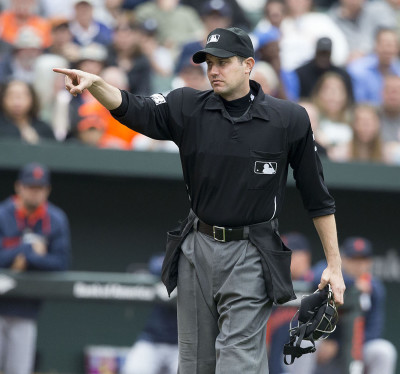
Complaining about officiating across all professional sports will never go away even with the emergence of advanced replay systems. The leagues of all four major sports have implemented challenge or review systems, but still there is no way to diminish the constant judgment calls.
Our sports subconscious clings to the unexpected drama that can be debated and argued for years. While we cringe at the terrible strike call or the insane pass interference call that killed our team’s changes, we need unexpected and human-decided drama to get us to the edge of our seats.
This will never change, but it is these controversies and decisions that spark interest and move the conversation from the boring “who won?” and “who lost?” jargon. Yes, I know there are few worse feelings in life than having your team get knocked out of the playoffs due to a “blown call.”
However, two things need to be clear about this unique argument. First of all, I am in no way asking you to be happy about your team losing in heartbreaking fashion. Second, and more importantly, we as fans need to accept the fact that officials have a nearly impossible job and we must embrace the entertaining imperfections that are blown calls.
Furthermore, the emergence of technology puts umpires and referees under increased scrutiny. If you are sitting on your couch eating greasy food and taking to Twitter to threaten a referee for being worthless, you are the one that is the lowlife. At the end of the day, these tough calls even themselves out over the course of a game, season and one’s lifelong sports fandom.
On Monday Night Football in Week 5, the Pittsburgh Steelers-San Diego Chargers game, the officials never realized that the clock ran off over twenty seconds of time after the ball was kicked out of bounds. The game clock manager completely messed up and it is the responsibility of the referees to catch that mistake and reset the game clock before the next play.
The gaffe created an eruption on Twitter and caused outrage from fans, and rightfully so. The Steelers won on the last play of the game as time expired, but there technically should have been some time left on the clock. Losing because of a malfunctioning clock would be downright heartbreaking, but outside of that final drive, which was heightening with excitement from the clock controversy, it was a rather boring and uneventful game.
The controversial moments dramatize outcomes and create memorable games that will be remembered forever. Think back to the Seattle Seahawks’ “Fail Mary” play to beat the Green Bay Packers in 2012, the Jeffrey Maier interference that led to the Derek Jeter homerun in the 1996 ALCS and the famous Snow Bowl involving the controversial tuck rule between the New England Patriots and Oakland Raiders.
Whether these plays helped your team or not, they were all extremely entertaining and are the moments we remember. We need the painfully unexpected moments in sports that draw us in and make us throw the remote and wake up the neighbors.
For example, the Super Bowl run last year for Patriots fans held extra meaning because of the Deflategate saga. To the modernists that want robots officiating and using instant replay to decide judgment calls you are not only wrong, but also downright stupid. The excitement and drama in sports comes from the unpredictable nature of these calls.
Controversies on plays that cannot actually be defined in the rule book, like a pass-interference call or a goalie interference call in hockey, will never be void at the professional level of sports. So guess what? Learn to love it.
For example, everyone remembers all the instances the ref comes out from under the hood and everybody turns up the volume on the television awaiting the announcement of a challenged play in the waning minutes of a close game.
I’m here to tell you that mishap was awesome. It was a reason to watch SportsCenter the next day, tune into sports talk radio and the lunch conversation starter the next day. I do not encourage the referees to mess up on purpose, but it adds drama to sports rhetoric and that to me is what we, the fans, love even though all of you might not have realized it yet. So yes, Jim Joyce and Joey Crawford, I get excited when you are out there.
In a strange way, games are much like movies. The audience needs a good plot with unexpected twists. The only difference is sports games have no scripts, so if you lack that controversial call or that game-changing play, chances are that game will be all but forgotten before even reading the Sunday morning paper.
People love to complain about baseball being too boring, and then you get the most entertaining inning of the postseason all because of a “blown call” and fans find a way to complain about that too because of miscommunication. Seriously? The umps actually got the call right, there was just a miscue in the process, but the call was still right. So yes, Twitter egg, please stop trolling on twitter.
Once again it is really important to be able to separate the difference between the responsibility of the officials and the entertainment fans receive from watching these blown calls. Yes, they messed up, but we get the benefits from it as fans.
You might be a stubborn homer who cringes at any bad call, but it is impossible to deny that miscues by officials provide unexpected drama that makes you love sports. We would all fail our classes or be fired from work if we were set to the same standards as these referees. Death, taxes and blown calls.

